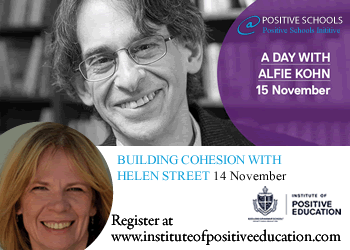AN AFTERNOON WITH HELEN STREET
The importance of developing social cohesion in classrooms and school communities
It could be said that we are all born as individuals, however, from the moment we interact with the world around us, we become social beings. We develop a social identity as a result of the cohesive forces that binds us to others, and the environmental influences that guide us.
Our social identity shapes our attitudes, values and beliefs. It guides our thoughts, feelings and behaviour. From the way we wear our clothes to the major choices we make in our lives, we are all influenced by the social forces that define us and direct our every move. In schools, these social forces are akin to ‘social and emotional glue’. They include young people’s connection to others, their sense of belonging and their adherence to the messages contained within the very fabric of their environment.
This workshop will examine the importance of social influence, social cohesion and social norms within our classrooms and schools. Moreover, we will look at practical and important ways in which we can influence the healthy development of social cohesion and ensure we support flourishing and cohesive learning communities.
A DAY WITH ALFIE KOHN
Rethinking the conventional wisdom about curriculum, assessment, and motivation
Many schools’ attempts to be intellectually ‘rigorous’ tend to backfire because their traditional methods rely on outdated conceptions of learning. Even today it’s still common to offer an education that’s more about memorizing facts and practising isolated skills than understanding ideas from the inside out; to exclude students from any meaningful decision-making role; and to use grades, tests, homework, lectures, worksheets, competition, punishments, and rewards. These practices can sometimes elicit compliance but not genuine engagement and enthusiasm about playing with words, numbers, and ideas.
In this full-day seminar, Alfie Kohn will explore alternatives to these conventional practices, explaining why a different approach to curriculum (what we’re teaching) and pedagogy (how we’re teaching) – an approach that truly puts students at the centre – isn’t just a realistic possibility but one far more likely to help kids become critical thinkers and lifelong learners.
Register for one or both days.
www.instituteofpositiveeducation.com



